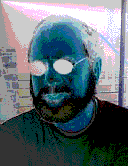When we last left Agnes before the mirror, she was asking her self, Why she would want to identify with her face, self, in a mirror. Well, Kundera was thinking of Lacan, but as he says in Immortality, not all that seriously. For it is not a self so much as one's self, one's own, one potentiality and what one makes of it. One's thrownness, as Heidegger says. (One way to get into that gesture in the mirror, to get to what the novel is all about in terms of following the possible in-significance of the gesture of Agnes throughout the investigation of it in the novel, is perhaps to think through the path followed by Heidegger in paraterms of faciality, facticity, Ereignis, Da-sein, etc., but we are not going that way, this time. Perhaps another day. Another conferential meeting of faces, but not if they all crumble before then.) Remember that Agnes--not the Agnes of God, not that actual film, but the Agnes of another film, that virtual one, Immortality--says that when she asks the question of Why identify with that face in the mirror?, it all CRUMB.LES. Crumbles. Right before her (us). Strange. A Stranger. Comes forth. Has been waiting to come forth.
It is, indeed, remarkable that at the end of, the rebeginning of something else, in The Order of Things, Foucault writes:
If those arrangements were to disappear, if some event of which we can at the moment do no more than sense the possibility--without knowing either what its form will be or what it promises--were to cause them to crumble, as the ground [grund-abgrund] of Classical thought did, at the end of the eighteenth century, then one can certainly wager that man would be erased, like a face drawn in sand at the edge of the sea. (387)
I recall, for us, also a similar statement by Foucault in The Archaeology of Knowledge, which is not a book on structuralism, not on despotic signifiers! He responds to a hypothetical reader--basically, gets in a fight with, in the face of, this reader--so many despotic readers who would reinscribe him back into papa-police state.ment--... Foucault responds by saying: "I am no doubt not the only one who writes in order to have no face. Do not ask who I am and do not ask me to remain the same: leave it to our bureaucrats and our police to see that our papers are in order. At least spare us their morality when we write" (17).
This whole paratheme of losing face, uncovering the inhuman (in Archaeology it is the low indistinct "murmuring" that comes from the archive)...uncovering the inhuman "statements" (not phrases, not propositions, not speech acts, but inhuman statements such as "Azert")...This whole paratheme of losing face, and in losing that face crumbling, crumbling, crumbling...This whole paratheme is even idiocyncratically, yet harmoniously, put forth by Jean Baudrillard, in The Illusion of the End, when he speaks of the passing of the world, the world as we, as figures, have come to know it between two modes of language. He tells us:
The situation is, perhaps, an original one, but clearly, so far as the final result is concerned, the game is already lost. We shall never experience the original chaos, the Big Bang: the file is closed on that; we weren't there. But, where the final moment is concerned--the Big Crumb--we might have some hope of seeing that. Some hope of enjoying the end, to make up for not being able to enjoy the origin. These are the only two interesting moments and, since we have been denied the first, we might as well put all our energies into accelerating the end, into hastening things to their definitive doom, which we could at least consume as spectacle. (115)
This is the end, my friends. ... I have often speculated--tried to add to Giorgio Agamben's menagerie--on the most perfect exemplar of the coming community, the whatever singularity that would be the very epitome of speaking, as Foucault refers to it and Agamben as well, from "the blank space," from the empty space of the para-deigma, the example, from the emptiness of irony, from irony fatigue itself, and I have more so than not selected none other than

I want to turn, in all seriousness (hahahahaha), to Crumb now as the man who has lost not only his face--has given it up freely--but also his qualities and content. In talking about RCrumb, I will be talking about the end, my friends. (Then, at the end of the end, we will all take a quick, very quick test drive of a few images and then retire to a late evening dinner, and much talk about what I have just said and will have said, late into the night, if not early morning.
Goooooooooooooingggggggggg toCRUMBLing
|
| Source: The background image is of Walter Benjamin's Death Certificate. The photo to the left is of WB. |
